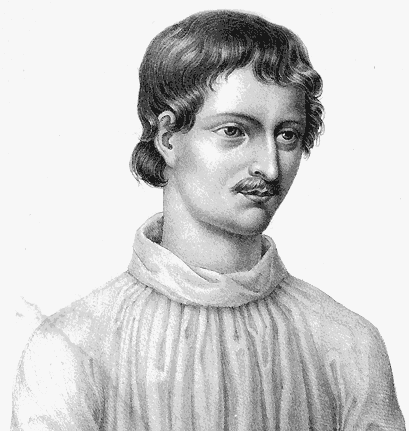
 On February 19, 1600, Giordano Bruno, "nude, bound to a stake, accompanied by
the mocking solemnity and chanted prayers of his tormentors..., was brought forth to the
Square of Flowers in Rome. His body was consigned to the flames." (Singer at 180)
On February 19, 1600, Giordano Bruno, "nude, bound to a stake, accompanied by
the mocking solemnity and chanted prayers of his tormentors..., was brought forth to the
Square of Flowers in Rome. His body was consigned to the flames." (Singer at 180) The Inquisition had condemned a philosopher. A Venetian magistrate declared that despite serious crimes of heresy, "he is otherwise of the most excellent and rare talents that can be desired, and of exquisite doctrine and knowledge." (Id. at 170)
Among Bruno's heresies was adherence to the view of Copernicus that the earth was not the center of the universe, but revolved around the sun. History has emphasized this heresy, but it is not chief among Bruno's crimes.
Ordained a monk, he left his order, wandered around Europe, and wrote books subversive of church dogma and critical of Christian ethics. He denounced the papacy and even satirized Christ as a centaur (a person made up of two natures). (Lindsay at 9-10 and 155-158, Imerti at 29-46)
Bruno wrote: "It is a thing fit for an ambitious person, and for a presumptuous, vain, and envious mind, to want to persuade others that there is only one way to investigate and to come to the cognition of nature; and for one to convince himself that this is so, is a thing worthy of a a mad man and a man without reason." (Imerti at 31)
He attacked those who claimed to know what they did not know and those who denied knowing what they did know. "He condemns all those who do not seek wisdom for her own sake, but would rather sell her for money or honors or for other kinds of gain." (Imerti at 36-37)
Bruno appeared at a critical point in history. Medieval society grew out of a belief in a comprehensive unity of nature where God, the pope, a king and all other persons each had a proper and fit place. After a thousand years, that society was dissolving in every direction.
Bruno envisioned a new theology with features like those later discovered through the sciences. He believed that divine will appeared as energy carried by particles of matter, or atoms, and that there were infinite worlds of which ours was only one.
High church officials, who achieved their positions through conformity and politics, must have seen in Bruno a rootless, noisy, abrasive, malicious, and, yes, dangerous person properly punished as a heretic.
Not many years later, the example of Bruno was used to intimidate Galileo Gallilei (1564-1642), incomparably greater.
In retrospect, the errors in medieval beliefs are obvious. Might the adherence of an entire society to obviously erroneous beliefs suggest that we too may be subject to fundamental errors and that our systems of belief will later be considered obviously in error?
Alfred North Whitehead, British mathematician and philosopher, wrote: "A scientific realism, based on mechanism, is conjoined with an unwavering belief in the world of men and of the higher animals as being composed of self-determining organisms. This radical inconsistency at the basis of modern thought accounts for much that is half-hearted and wavering in our civilization. It would be going too far to say that it distracts throught. It enfeebles it, by reason of the inconsistency lurking in the background. After all, the men of the Middle Ages were in pursuit of an excellency of which we have nearly forgotten the existence. They set before themselves the ideal of the attainment of a harmony of the understanding. We are content with superficial orderings from diverse arbitrary starting points. ... It is not popular to dwell on the absolute contradiction here involved. It is the fact, however you gloze it over with phrases."
Martin Buber, a modern thinker rooted in medieval Jewish wisdom, approached the question from another direction: "It is only when reality is turned into logic and A and non-A dare no longer dwell together, that we get determinism and indeterminism, a doctrine of predestination and a doctrine of freedom, each excluding the other. According to the logical conception of truth only one of two contraries can be true, but in the reality of life as one lives it they are inseparable. The person who makes a decision knows that his deciding is no self-delusion; the person who has acted knows that he was and is in the hand of God. The unity of the contraries is the mystery at the innermost core of the dialogue."
Bruno wrote that "contraries truly coincide ... they are derived from one principle, and they are one in reality and Substance..." (Concerning the Cause)
Our human nature longs for a unity of the contraries. The longing has failed of realization after many centuries of effort. It is perhaps necessary to inquire whether such a longing is impossible of realization and, if so, to consider the consequences.


References:
Greenberg, The Infinite in Giordano Bruno-- with a translation of Bruno's Concerning the Cause, Principle, and One (King's Crown Press 1950)
Imerti, Introduction to and Translation of Bruno's The Expulsion of the Triumphant Beast (Rutgers University Press 1964)
Lindsay, Introduction to and Translation of Bruno's Concerning the Cause, Principle and Unity (International Publishers 1962)
Singer, Giordano Bruno, His Life and Thought (Henry Schuman 1950)
Whitehead, Science and the Modern World (The Free Press 1967)
Glatzer, The Way of Response, selections from the writings of Martin Buber (Schocken Press 1966)
Walter Kaufmann, Discovering the Mind, Vol. II, Nietzsche, Heidegger, and Buber (McGraw-Hill 1980)


Return to "An Exposition"